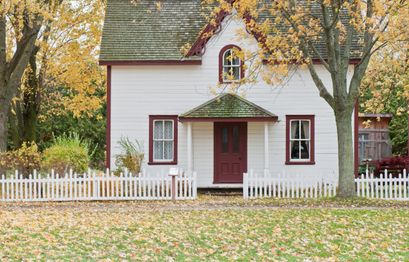Cryptocurrency and homeownership might seem like an unlikely pair, but for potential homeowners focused on cutting waste and overhead, they go together quite well. The spirit of self-reliance and autonomy that attracts so many to cryptocurrency and other forms of alternative finance are staples of good homeownership habits.
Cryptocurrency and homeownership might seem like an unlikely pair, but for potential homeowners focused on cutting waste and overhead, they go together quite well. The spirit of self-reliance and autonomy that attracts so many to cryptocurrency and other forms of alternative finance are staples of good homeownership habits.
Let’s examine whether you can purchase a home with your cryptocurrency, some of the habits that make cryptocurrency holders ideal homeowners, and how tiny houses and sustainability fit into the equation.
Can You Purchase Real Estate Using Cryptocurrency?
Cryptocurrency has the potential to disrupt any industry relying heavily on ledgers for transactions. If you’ve ever looked at homeownership or even renting, you know that there’s a massive amount of paperwork involved in any real estate purchase or rental process. That’s where smart contracts come in, popularized by the Ethereum cryptocurrency.
Smart contracts record transaction data securely, safely, and appropriately, making them ideal for real estate transactions. They also lower transaction costs and make currency exchange more ethical — the true goals of many cryptocurrency users.
While cryptocurrency real estate purchases are not yet the norm, the future looks bright. Cryptocurrency can eliminate wasteful fees and days of time spent waiting. In fact, it can automate the real estate transaction process.
The Hidden Costs of Purchasing a Home
Cryptocurrency could provide a fair amount of transparency to what are traditionally the hidden costs and fees of homeownership. With 75% of Americans prioritizing homeownership in their lives, they often fail to consider the costs of lawn maintenance, homeownership association fees, plumbing, appliances, and other maintenance fees as well as the bundle of closing costs associated with homeownership.
Add property taxes and mortgage interest to those costs, and you might want to take a second look at whether homeownership is right for you. Of course, not all homes require such large investments in maintenance or environmentally destructive, waste-generating processes. That’s why some cryptocurrency users opt for a more self-reliant lifestyle in a tiny home.
Self-Reliance as a Lifestyle
If you’re interested in cryptocurrency or currently already use it, it’s likely you consider yourself self-reliant and able to work outside the norms of society for any given reason. Cryptocurrency users also tend to be pragmatic and focused on transparency; they are reliant and resilient.
All of these qualities also match up to the prospective tiny house owner. Many tiny homes are self-sustaining and mobile (sometimes to adhere to current zoning laws). Both cryptocurrency users and tiny homeowners usually appreciate the practical and resourceful nature of reusing byproducts in an ethical and environmentally friendly way, making cryptocurrency and homeownership an ideal match.
About the Tiny Home Investment
If you’re thinking about a tiny home, cost is a major benefit, as most tiny homes cost between $23,000 and $60,000. It’s a much more affordable option for many people when compared to traditional homeownership. If a property meets your basic needs, is affordable, and is eco-friendly, you’re moving in the right direction for your lifestyle. Not to mention, buying a plot of land and clearing the area for a tiny-home will not only be more cost-effective based on the size, but you’ll be able to preserve the surrounding natural area because of your smaller overall footprint.
The tiny home movement exists not just to meet the needs of low-income homeowners, retired homeowners, and those looking for a sustainable abode, but also a generational disruption that many require to survive in a competitive and rapidly changing economy. This creates and strengthens a link between tiny homeownership and cryptocurrency, making cryptocurrency real estate especially useful for tiny home investments.
Tiny homes could also work as ethical investment properties for those interested in earning income as landlords. Using cryptocurrency for rental transactions can also eliminate the waste of paperwork fees while contributing to a decentralized ledger.
The Dangers of Purchasing an Older Home
In addition to negative attachments to the past, outdated plumbing and structural issues and higher maintenance costs, older homes bring with them potential dangers, such as the presence of lead pipes and paint or asbestos.
Even homes built in 1940-1980 carry asbestos risks thanks to the wall-joint compound or sheetrock mud used in drywall work. You can eliminate this risk, and the eventual cost of dealing with it by selecting a more environmentally friendly, sustainable tiny home. It’s even safer to build and work on tiny homes versus older structures.
Overall, tiny home enthusiasts and cryptocurrency owners understand the necessity of disruption. Our current way of life in America doesn’t work for everyone, and it’s time to make changes so that we can meet our financial goals, protect our environment, and pursue our chosen lifestyles. By combining cryptocurrency use and tiny home real estate purchase, we can eliminate harmful financial practices and waste, establish a more secure paper trail, and reduce our impact on the environment.










